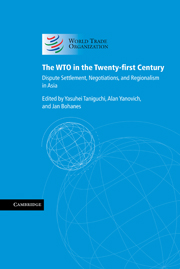Book contents
- Frontmatter
- Contents
- Notes on contributors
- Acknowledgements
- Table of dispute settlement cases and reports
- List of abbreviations
- Introduction
- PART I The WTO at Ten
- 1 The WTO's tenth anniversary
- 2 The WTO at ten: its multilateral and regional involvements
- PART II Accomplishments and Future Prospects of the WTO Dispute Settlement System
- PART III Asian Perspectives on WTO Dispute Settlement
- PART IV The Doha Development Agenda and Beyond
- PART V Asian Regional Integration and the Multilateral Trading System
- Index
2 - The WTO at ten: its multilateral and regional involvements
from PART I - The WTO at Ten
Published online by Cambridge University Press: 05 March 2012
- Frontmatter
- Contents
- Notes on contributors
- Acknowledgements
- Table of dispute settlement cases and reports
- List of abbreviations
- Introduction
- PART I The WTO at Ten
- 1 The WTO's tenth anniversary
- 2 The WTO at ten: its multilateral and regional involvements
- PART II Accomplishments and Future Prospects of the WTO Dispute Settlement System
- PART III Asian Perspectives on WTO Dispute Settlement
- PART IV The Doha Development Agenda and Beyond
- PART V Asian Regional Integration and the Multilateral Trading System
- Index
Summary
Before going into the substance of my remarks about the World Trade Organization (WTO) at ten, and its multilateral and regional involvements, I should like to say something about the work I have done at the WTO and what I am doing in my new role at the United Nations Conference on Trade and Development (UNCTAD).
Whatever the outcome of the Doha Development Agenda, we must never forget the middle name of the Round: development. And development is not the middle name of UNCTAD; it is its first name, middle name and last name. Development – trade and development – is actually the real mandate of UNCTAD, and UNCTAD will always be there to try to complement efforts to promote the understanding and capacity of countries to take part in the negotiations, and also to motivate them to reach an early solution.
When I was at the WTO, I had to contend with a number of lawyers – who happen to constitute the largest group of professionals working there – and I thought it was quite a challenging task, being an economist and having to face meetings with lawyers. But at UNCTAD, you cannot imagine the kind of tasks I have to face with one single group of professionals: not lawyers this time, but economists. Such different professions, but nevertheless, I do think they complement one another. To illustrate this point, I should like to tell a joke, one that has been circulating mainly among economists, but that involves both economists and lawyers. An experiment was conducted to test the behaviour of three types of human beings: scientists, lawyers, and economists.
- Type
- Chapter
- Information
- The WTO in the Twenty-first CenturyDispute Settlement, Negotiations, and Regionalism in Asia, pp. 10 - 20Publisher: Cambridge University PressPrint publication year: 2007

